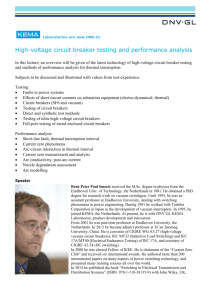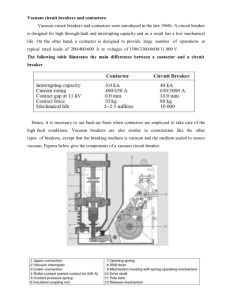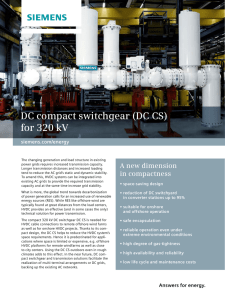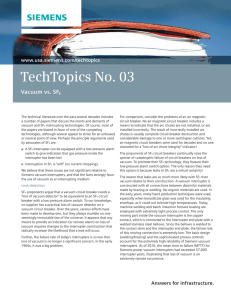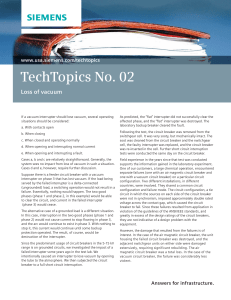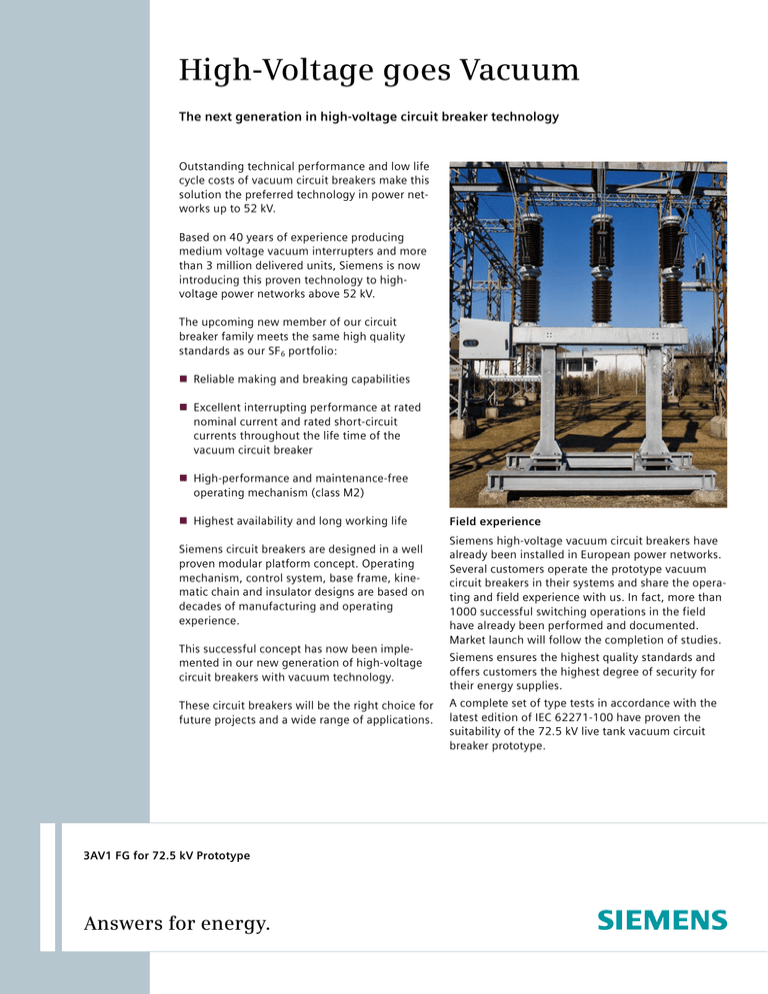
High-Voltage goes Vacuum
The next generation in high-voltage circuit breaker technology
Outstanding technical performance and low life
cycle costs of vacuum circuit breakers make this
solution the preferred technology in power networks up to 52 kV.
Based on 40 years of experience producing
medium voltage vacuum interrupters and more
than 3 million delivered units, Siemens is now
introducing this proven technology to highvoltage power networks above 52 kV.
The upcoming new member of our circuit
breaker family meets the same high quality
standards as our SF6 portfolio:
� Reliable making and breaking capabilities
� Excellent interrupting performance at rated
nominal current and rated short-circuit
currents throughout the life time of the
vacuum circuit breaker
� High-performance and maintenance-free
operating mechanism (class M2)
� Highest availability and long working life
Field experience
Siemens circuit breakers are designed in a well
proven modular platform concept. Operating
mechanism, control system, base frame, kinematic chain and insulator designs are based on
decades of manufacturing and operating
experience.
Siemens high-voltage vacuum circuit breakers have
already been installed in European power networks.
Several customers operate the prototype vacuum
circuit breakers in their systems and share the operating and field experience with us. In fact, more than
1000 successful switching operations in the field
have already been performed and documented.
Market launch will follow the completion of studies.
This successful concept has now been implemented in our new generation of high-voltage
circuit breakers with vacuum technology.
These circuit breakers will be the right choice for
future projects and a wide range of applications.
3AV1 FG for 72.5 kV Prototype
Answers for energy.
Siemens ensures the highest quality standards and
offers customers the highest degree of security for
their energy supplies.
A complete set of type tests in accordance with the
latest edition of IEC 62271-100 have proven the
suitability of the 72.5 kV live tank vacuum circuit
breaker prototype.
High-voltage vacuum circuit breaker 3AV1 prototype
Rated voltage
72.5 kV
Rated short time withstand current
Rated power-frequency withstand voltage
140 kV
Rated duration of short-circuit
Rated lightning impulse withstand voltage
325 kV
Rated peak withstand current (2.7 p.u.)
Rated frequency
50 Hz
Rated first pole to clear factor
1.5 p.u.
Capacitive voltage factor
1.4 p.u.
Rated nominal current
2500 A
Temperature range
-30 ... +40°C
Rated short-circuit current
31.5 kA
31.5 kA
3 s
85 kA
Capacitive class
C2
Insulating medium
N2
Values type tested in accordance with IEC 62271-100 (2008)
Other values on request
Efficient
Sealed for Life
• Maintenance-free
Performance
• Fully tested in accordance with
the latest edition of IEC Standard
• Service-free even with frequent
62271
breaking operations
• 2 cycle current interruption
• Feasible up to 145 kV
Ecological
Reliable
• Vacuum interrupting medium
• 40 years of experience in vacuum
switching technology
• Nitrogen insulating medium
• Suitable for low temperature
applications
Published by and copyright © 2011:
Siemens AG
Energy Sector
Freyeslebenstrasse 1
91058 Erlangen, Germany
Siemens AG
Energy Sector
Power Transmission Division
High Voltage Products
Nonnendammallee 104
13629 Berlin, Germany
www.siemens.com/energy
For more information please contact our
Customer Support Center.
Phone: +49 180 524 7000
Fax: +49 180 524 2471
(Charges depending on provider)
Email: support.energy@siemens.com
Power Transmission Division
Order No. E50001-D630-A196-X-4A00
Printed in Germany
Mu. PA 03112.0
Printed on elementary chlorine-free
bleached paper.
All rights reserved.
Trademarks mentioned in this document are the
property of Siemens AG, its affiliates, or their
respective owners.
Subject to change without prior notice.
The information in this document contains general
descriptions of the technical options available,
which may not apply cases. The required technical
options should therefore be specified in the
contract.

